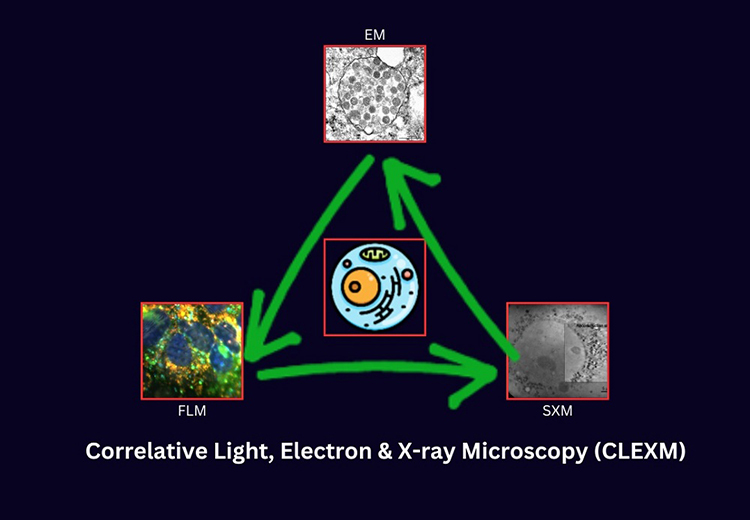UCD-led European biomedical imaging research secures €2.5m funding
Posted 7 July, 2023

A pan European research project led by University College Dublin using correlative multimodal imaging (CMI) to improve the biomedical understanding of disease and drug therapy has secured €2.5 million in funding.
The CLEXM (Correlative Light, Electron and X-ray Microscopy) project involves seven partner organisations across four countries and has been funded by Horizon Europe under the Marie Skłodowska-Curie Actions Doctoral Network (MSCA-DN) programme.
SiriusXT, a UCD spin-out company, which has developed the first commercial, laboratory-based soft x-ray microscope, is among the partner organisations.
The four year project officially commences September 2023, and will fund nine PhD candidate research projects.
Three of these will take place in UCD, two of which will be supervised by (opens in a new window)Professor Jeremy Simpson, College Principal at UCD College of Science, and (opens in a new window)Professor Oliver Blacque, from the UCD School of Biomolecular and Biomedical Science.
The third project will be supervised by Dr Sergey Kapishnikov, at SiriusXT.
"UCD is very pleased to be the Project Coordinator of project CLEXM. It provides an excellent opportunity to collaborate and build relationships with leading European research organisations as well as funding three PhD projects in UCD and building expertise in correlative multimodal cell imaging,” said Professor Simpson.
Tony McEnroe, SiriusXT CEO added: “As an SME, developing a highly innovative cell imaging microscope for the disease research and drug discovery markets, project CLEXM provides us with access to leading research talent, funding to achieve our development goals and an opportunity to collaborate with leading research organisations, many of whom are target customers for our microscope.
“The overarching objective of CLEMX project is to provide high-level training in the field of correlative multimode imaging to a new generation of doctoral candidates to provide them with the transferrable skills necessary for thriving careers in a high-growth area that will aid researchers in their quest to understand disease and to develop effective therapies.”
CMI is used by researchers to obtain a composite view of a biological sample with the multidimensional information about its structure, dynamics, function and chemical composition required to understand biomedical processes and diseases.
There is a growing need for disease and drug therapy researchers to better understand the linkages between structural and functional changes that occur in a cell and to be able to observe these from the cellular to the molecular scale.
The overall focus of the nine CLEXM projects is to demonstrate that the integration of a third imaging technique, Soft X-ray Tomography (SXT), into CLEM will make it easier and faster for researchers to correlate cellular structure with cellular function.
This will lead to a more complete view of the processes of disease and drug therapy.
The other project partners in addition to UCD and SiriusXT are Institut Pasteur (France), Aalen University (Germany), Ruprecht-Karls University Heidelberg (Germany), Synchrotron Soleil (France) and ALBA Synchrotron (Spain).
By: David Kearns, Digital Journalist / Media Officer, UCD University Relations (with materials from Micéal Whelan, UCD Research and Innovation)
To contact the UCD News & Content Team, email: newsdesk@ucd.ie






